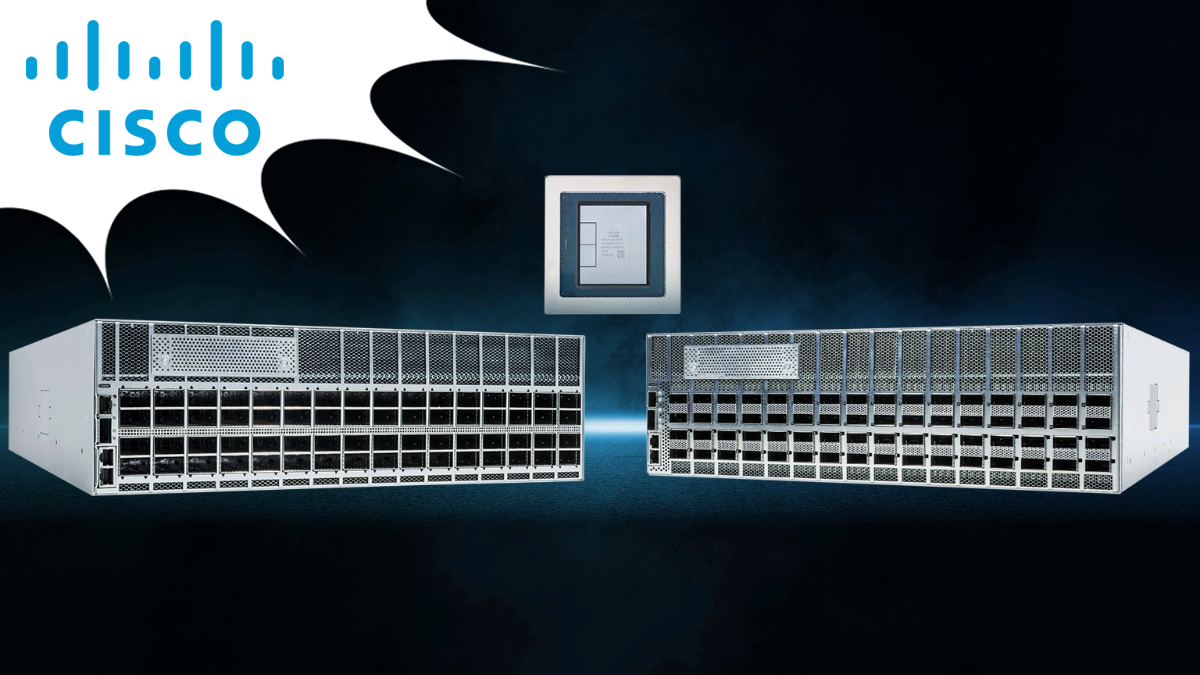Powered by the new Silicon One P200 chip, Cisco’s 8223 routing systems enable seamless ‘scale-across’ architectures that connect AI clusters across multiple data centers.
- The 8223 routing systems deliver large capacity and efficiency in a single ASIC router
- Available now to hyperscalers for secure, scalable AI infrastructure
- Cisco Silicon One P200 chip delivers deep-buffer routing silicon and enables interconnect bandwidth scale of over 3 Exabits per second (sits at the core of 8223)
Cisco has unveiled the Cisco 8223, allegedly the industry’s most optimised routing system for efficiently and securely connecting data centers and powering the next generation of artificial intelligence (AI) workloads.
As AI adoption accelerates, data centers face soaring demand, rising power constraints, and evolving security threats. The Cisco 8223 rises to the challenge as the only 51.2 terabits per second (Tbps) Ethernet fixed router built for the intense traffic of AI workloads between data centers.
Cisco’s latest Silicon One innovation – the P200 chip – sits at the core of the 8223.
“AI compute is outgrowing the capacity of even the largest data center, driving the need for reliable, secure connection of data centers hundreds of miles apart,” said Martin Lund, EVP, Cisco’s Common Hardware Group. “With the Cisco 8223, powered by the new Cisco Silicon One P200, we’re delivering the massive bandwidth, scale and security needed for distributed data center architectures.”
In many of the world’s data centers, AI workloads are stretching power and space limitations. Hyperscalers can’t scale-up (add more capacity into each individual system) or scale-out (connect multiple systems within a data center) any further. This dynamic puts increasing demand on data center interconnects, as the industry must “scale-across” by distributing AI workloads across multiple data centers. Without addressing the connection points between data centers, organizations could face performance challenges, capacity bottlenecks and suboptimal processing that wastes time, power and money. The Cisco 8223 system gives organizations the flexibility and programmability necessary to build these networks, with deep buffering to provide the cross-site security and reliability necessary for crucial workloads.
The 8223 is uniquely:
Power Efficient: The 8223 is the most power efficient routing system for scale-across networking. It is a deep-buffer routing solution optimized for fixed deployments that offers switch-like power efficiency, directly addressing the high energy demands of AI workloads. As a 3RU system, it is the most space efficient system of its kind. As AI clusters continue to ‘scale-across,’ power and space efficiency will only grow in importance.
Scalable without Compromise: The 8223 offers industry-leading bandwidth and the highest density of any fixed routing system in the industry. The only fixed routing system featuring 64 ports of 800G, the 8223 offers unmatched routing performance capable of processing over 20 billion packets per second and scaling up to 3 Exabits per second. It also features 800G coherent optics support, enabling data center interconnect and metro applications reaching up to 1000km. With the P200’s deep buffering capabilities, the new routing systems can absorb massive traffic surges from AI training, maintaining performance and preventing network slowdowns.
Intelligent and Adaptable: The 8223 can intelligently adapt to real-time network conditions. With the smart and programmable P200 silicon, it can support new, emerging network protocols and standards without requiring costly hardware upgrades. Networks can remain agile while preventing performance bottlenecks and accelerating the adoption of new features as AI traffic continues to evolve.
Secure: The 8223 offers protection at all levels – across hardware, software and entire networks. With features like line-rate encryption using post-quantum resilient algorithms, integrated security safeguards and continuous monitoring tools, the 8223 can safeguard against emerging threats. Seamless integration into Cisco’s observability platforms gives customers granular insights into network performance to help identify and resolve issues quickly, ensuring AI data traffic is secure and reliable.
Dave Maltz, Technical Fellow and Corporate Vice President, Azure Networking, Microsoft, comments:
“The increasing scale of the cloud and AI requires faster networks with more buffering to absorb bursts. We’re pleased to see the P200 providing innovation and more options in this space. Microsoft was an early adopter of Silicon One, and the common ASIC architecture has made it easier for us to expand from our initial use cases to multiple roles in DC, WAN, and AI/ML environments.”
Flexibility – An AI ‘Must Have’
The Cisco 8223 will initially be available for open-source SONiC deployments, with IOS XR on the horizon.
In addition to its availability in the fixed 8223 system, the P200 silicon itself will be deployable in modular platforms and disaggregated chassis, offering customers architectural consistency for any size network. The Cisco Nexus portfolio will also support systems running NX-OS based on the P200 in the near future. Cisco is delivering the agility and operational flexibility required for today’s AI infrastructure.
Dennis Cai, Vice President, Head of Network Infrastructure, Alibaba Cloud, comments:
“This breakthrough chip aligns perfectly with the evolution of Alibaba’s eCore architecture. We plan to leverage the P200 to build a single chip platform, serving as a foundational building block for expanding our eCore deployment. …this new routing chip will enable us to extend into the Core network, replacing traditional chassis-based routers with a cluster of P200-powered devices. This transition will significantly enhance the stability, reliability, and scalability of our DCI network … we are developing and exploring innovative disaggregated architectures using Cisco G200 for our high-performance datacenter network. The introduction of this advanced routing chip marks a pivotal step forward, empowering Alibaba to accelerate innovation and drive infrastructure expansion in the AI era.”











